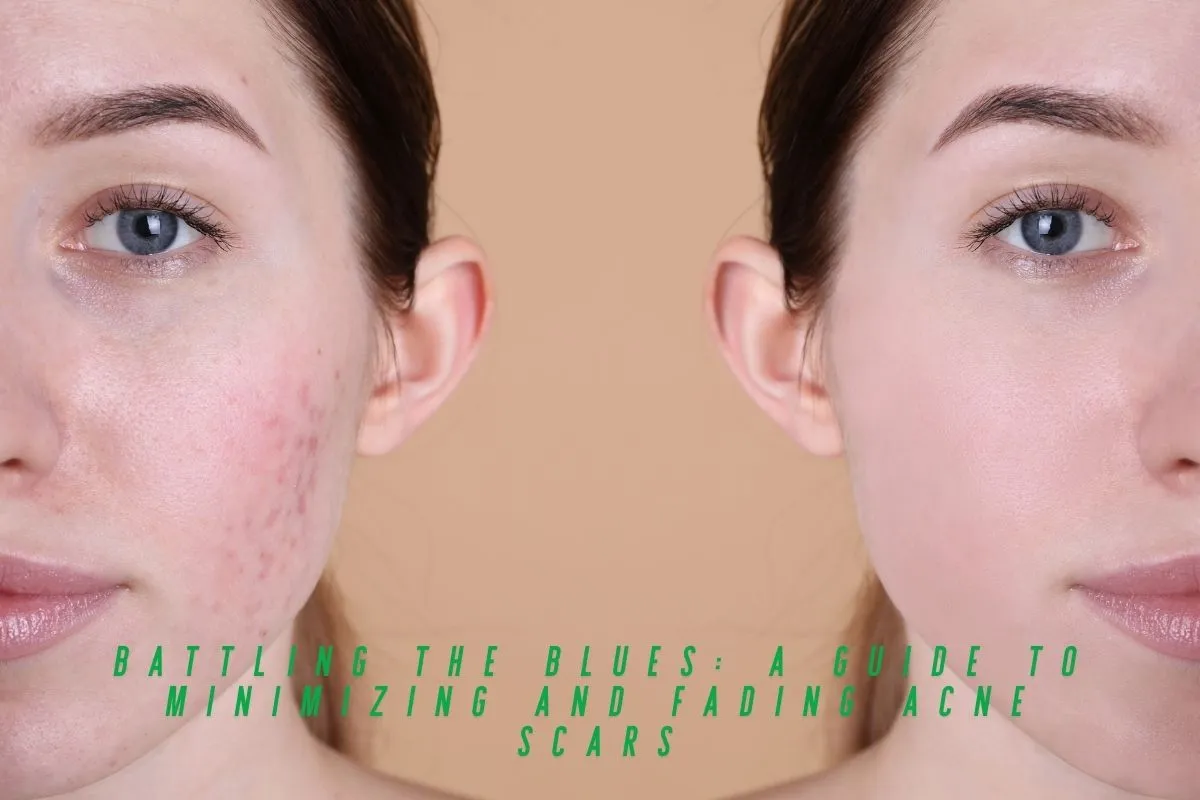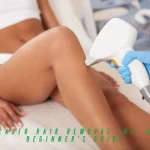Acne. It’s a nemesis most of us encounter at some point, leaving behind unwanted blemishes and sometimes, pesky scars. But fear not, fellow warriors against acne! While acne scars can be stubborn, there are ways to minimize their appearance and regain that smooth, glowing skin you deserve.
This guide will be your battle plan, packed with information on different types of acne scars, treatment options, and helpful tips. Remember, every scar and every journey is unique, so consulting a dermatologist is crucial for creating a personalized strategy.
Understanding Your Enemy: The Different Types of Acne Scars
Acne scars come in various forms, each requiring a slightly different approach. Here’s a breakdown of the main types:
- Atrophic scars: These are indented scars that form when there’s a loss of collagen in the skin. They can be further categorized as ice pick scars (deep and narrow), rolling scars (wavy), and boxcar scars (wider with sharp edges).
- Hypertrophic scars: These are raised scars that occur when the body produces too much collagen during healing. They typically don’t extend beyond the original pimple.
- Keloid scars: Similar to hypertrophic scars, keloids are raised and often extend beyond the original blemish.
Early Intervention is Key
As Dr. Dendy Engelman, a board-certified dermatologist, emphasizes, treating acne early and consistently can significantly reduce the risk of scarring. So, if you’re struggling with breakouts, don’t hesitate to seek professional help from a dermatologist. They can recommend a skincare routine tailored to your specific needs and help prevent those pesky scars from forming in the first place.
The Power of Skincare: Products for Minimizing Scars
While there’s no magic potion to erase scars, incorporating certain ingredients into your skincare routine can make a big difference. Here are some key players:
- Retinoids: These powerhouse ingredients, as highlighted by Dr. Joshua Zeichner, a renowned dermatologist, stimulate collagen production and improve the appearance of scars.
- Alpha hydroxy acids (AHAs) and beta hydroxy acids (BHAs): These exfoliating acids help slough off dead skin cells, promoting smoother texture and potentially reducing the appearance of shallow scars.
- Vitamin C: This antioxidant is a friend to your skin, promoting collagen production and brightening your overall appearance.
Beyond Basics: Treatments for Deeper Scars
For more stubborn scars, consider these in-office treatments, always performed by a qualified dermatologist:
- Chemical peels: As Dr. Melanie Palm, a board-certified dermatologist, explains, chemical peels use controlled acids to exfoliate the skin’s top layers, reducing the visibility of superficial acne scars.
- Microdermabrasion: This treatment uses tiny crystals to gently abrade the skin’s surface, similar to a chemical peel but with a more targeted approach.
- Laser treatments: Dr. Doris Day, a clinical professor of dermatology, highlights the effectiveness of laser treatments like fractional laser resurfacing. These lasers target deeper layers of skin, stimulating collagen production and improving the appearance of scars.
- Microneedling: This minimally invasive treatment uses tiny needles to create controlled micro-injuries in the skin, triggering collagen production and improving skin texture as noted by Dr. Jennifer Linder, a dermatologist.
Remember: Consistency is key for optimal results with any treatment plan. Don’t get discouraged if you don’t see overnight changes. Be patient and stick with your dermatologist’s recommendations.
A Holistic Approach: Beyond Products and Procedures
While treatments and products are powerful tools, a holistic approach is key. Here are some additional tips:
- Sun protection: Sun exposure can worsen scars, so sunscreen is your BFF.
- Hydration: Drinking plenty of water keeps your skin plump and healthy, promoting healing.
- Stress management: Stress can exacerbate acne breakouts, and potentially worsen scarring. Techniques like meditation, yoga, or even spending time in nature can be incredibly helpful.
- Healthy lifestyle: Eating a balanced diet and getting enough sleep contribute to overall skin health.
The Emotional Impact of Acne Scars
As with any skin condition, acne scars can take a toll on your self-esteem. Remember, you’re not alone! Many people deal with acne scars, and there’s help available. If you’re struggling emotionally, talking to a therapist or counselor can be incredibly beneficial.
The Road to Clearer, Smoother Skin
The journey to minimizing acne scars may require some patience and effort, but with the right approach, you can achieve significant improvements. Remember, consult a dermatologist to develop a personalized treatment plan. Embrace a healthy lifestyle, manage stress, and most importantly, be kind to yourself!
How to Minimize Acne Scars: A Step-by-Step Guide
Understanding Acne Scars
Before diving into treatment options, it’s important to understand the different types of acne scars:
- Ice Pick Scars: Narrow, deep scars that resemble puncture marks.
- Boxcar Scars: Wide, box-shaped scars with sharp edges.
- Rolling Scars: Wavy scars that make the skin look uneven.
- Hypertrophic Scars: Raised, thick scars that extend beyond the original wound.
- Keloid Scars: Raised, thick scars that extend beyond the original wound and can grow over time.
Over-the-Counter Treatments
- Retinoids: These vitamin A derivatives can help stimulate collagen production and reduce the appearance of scars. Look for products with retinol or retinoid acids like adapalene.
- Alpha Hydroxy Acids (AHAs): AHAs can help exfoliate the skin and improve the appearance of superficial scars.
- Niacinamide: This vitamin B3 derivative can help reduce inflammation and improve skin texture.
In-Office Procedures
For more severe scarring, consider these professional treatments:
- Chemical Peels: These treatments use acids to exfoliate the skin and promote cell turnover.
- Microdermabrasion: This minimally invasive procedure uses a diamond-tipped wand to exfoliate the skin.
- Microneedling: This procedure involves using tiny needles to create micro-injuries in the skin, which stimulates collagen production.
- Laser Therapy: Laser treatments can target different types of scars and improve their appearance.
Home Remedies
While home remedies may not be as effective as professional treatments, they can help to improve the appearance of mild acne scars:
- Aloe Vera: Apply aloe vera gel to your scars to soothe inflammation and promote healing.
- Honey: Honey has antibacterial and anti-inflammatory properties that can help to reduce the appearance of scars.
- Vitamin E Oil: Vitamin E oil can help to moisturize the skin and reduce the appearance of scars.
Preventing Future Scarring
To prevent future acne scars, follow these tips:
- Don’t Pick at Your Pimples: Picking at your pimples can worsen inflammation and increase the risk of scarring.
- Avoid Harsh Scrubs: Harsh scrubs can irritate your skin and make scarring worse.
- Protect Your Skin from the Sun: Sun exposure can darken scars, so always wear sunscreen with SPF 30 or higher.
- Manage Stress: Stress can worsen acne, so find healthy ways to manage stress, such as yoga, meditation, or spending time in nature.
Frequently Asked Questions
- How long does it take to get rid of acne scars?
- The time it takes to get rid of acne scars varies depending on the severity of the scars and the treatment method used.
- Can I prevent acne scars?
- The best way to prevent acne scars is to treat acne early and avoid picking at your pimples.
- Are there any natural remedies for acne scars?
- While natural remedies may help, it’s important to consult with a dermatologist for the most effective treatment.
- How often should I use acne scar treatments?
- Follow the instructions on the product label or the recommendations of your dermatologist.
- Can I combine different treatments for acne scars?
- It’s best to consult with a dermatologist to create a personalized treatment plan. Combining multiple treatments may increase the risk of side effects.
Remember, patience is key when treating acne scars. It may take several months to see significant improvement.




